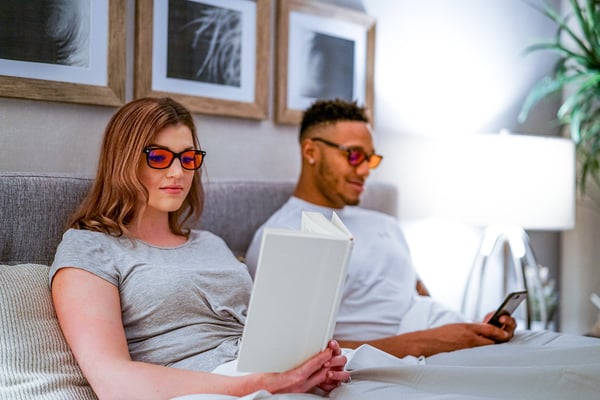
Do you have a hard time falling asleep and/or staying asleep?
If you do, you are not alone. Many people have sleeping problems. There are a lot of reasons why people have this issue. Examples include stress, physical disturbances such as arthritis and environmental factors like temperature.
In addition to these, being exposed to excessive artificial blue light in the evening may also be contributing to your poor sleep.
What is blue light and where does it come from?
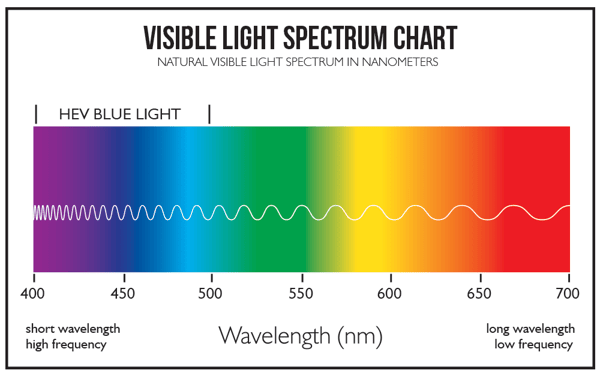
Blue light is literally everywhere.
Being exposed to some blue light is a good thing and can be helpful. Especially in the earlier part of the day. As the day progresses, and it turns to night, we should limit our exposure as it can affect our natural evening process of falling asleep.
A few sources of blue light include the sun, handheld digital devices, computer screens, cell phones, televisions and LED lighting.
Artificial lighting is a major contributor of blue light
As the sunlight fades away and the day turns to night, the lights go on. Having indoor and outdoor artificial lighting is one of the worlds greatest inventions.
Have you ever looked at a city at night when flying over it? It is spectacular to see. It is illuminated by light and can be seen miles away.
However, like all things in life, balance and moderation is something to be mindful of.
Too much artificial blue light exposure at night can be counterproductive for sleep
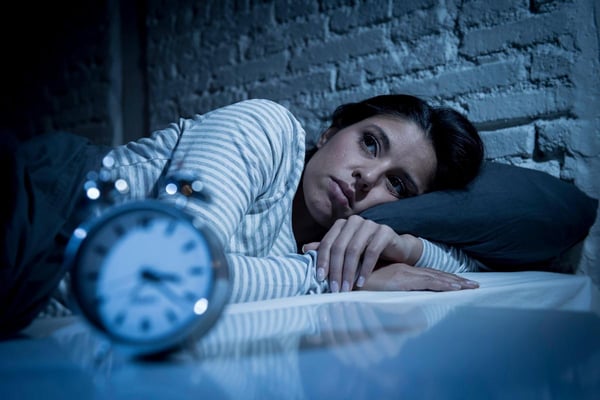
Starting about 2 hours before going to bed the human body starts producing its own “sleep hormone” melatonin when lighting is dim. This is referred to as dim-light melatonin onset (DLMO).
What is melatonin and what does it do?
Melatonin is the hormone in your brain that regulates the natural wake-sleep cycle and is commonly referred to as the circadian rhythm. The body's ability to produce it is dependent on the detection of light and dark. (1)
As the day turns to night, and the sun disappears, the body switches to evening mode and eventually sleep sets in.
In addition to regulating sleep and wakefulness, melatonin also
- acts an antioxidant and has been shown to be twice as active as vitamin E
- helps combats inflammation
- helps decrease negative menopause symptoms
- helps eases jet lag
- helps strengthen the immune system
Being exposed to bright artificial light later into the evening delays the circadian phase causing later wake-up time and later sleep onset. If there is continued exposure to light brightness (illuminance) as the evening progresses the delayed effect gets stronger. (4)
If the pattern of being exposed to evening artificial light continues over time, sleep onset can become a problem. Getting to sleep, staying asleep and having restful sleeps becomes more scarce. The result can negatively affect how you feel and function during the day.
Related Melatonin article: Melatonin, Memory and Macular Degeneration: Important Implications For Chronic Disease
Related article: How To Help Yourself Sleep Better At Night
What types of artificial blue light sources negatively affect sleep and the circadian phase?
Sources include:
- cell phones
- computer screens
- digital handheld devices
- laptops
- LED & artificial lighting
- television screens
What can you do to naturally increase melatonin production in the evening?
The most obvious answer is to reduce exposure to artificial blue light in the evening. This can be accomplished by being mindful of the light that is around. If the lighting is very bright, either turn it off, or dim the lighting.
Reduce screen time when using computers and other electronic devices in the evening, keep the screen at a distance from your eyes.
Wearing blue light blocking glasses may help with sleep
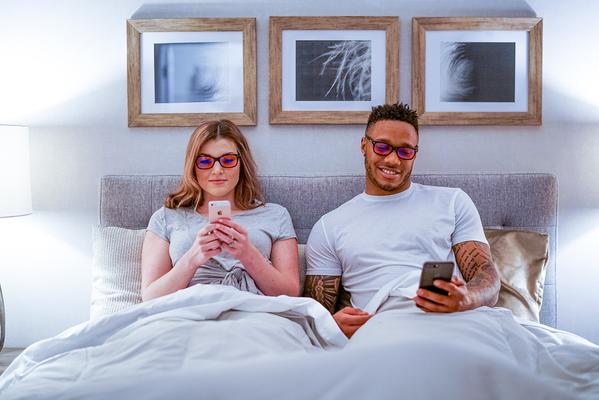
There is a lot of research, interest and real life experience on the use of blue light blocking glasses for reducing eyestrain and helping to increase the body's natural production of the sleep hormone melatonin when worn 2 hours before bedtime.
What type of Blue Light Blocking Glasses should you wear?
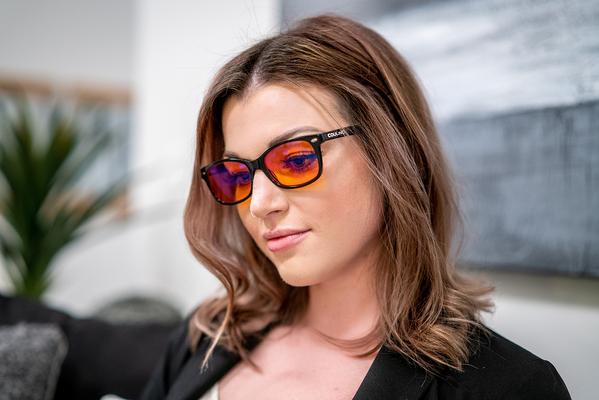
You will want to wear glasses with dark orange lenses.
We recommend that you wear Couling Sleep Orange Optics®. They block 95+% blue light.
This style blocks the most blue light of any glasses available. In fact, many other glasses available block less than 20% blue light. Which is more suited for daytime use.
In addition to Orange Optics blocking the most blue light, they also look very professional and are exceptionally good quality!
They are an “out and about” glasses style that are best worn in the evening. Dress up or dress down, you'll be looking good!
You can wear them working on the computer, having dinner, socializing with friends, watching TV, and when you are settling down for the night.
Here are some benefits & features of wearing Orange Optics
Benefits
- Helps reduce digital eyestrain and fatigue
- Enhances and preserves color perception and focus
- Decreases reflection and screen glare
- Diminishes discomfort from spotted vision, tearful eyes and dry eyes
- Enhances eye health and longevity
- Improves sleep quality and mood
- Can be worn indoors and outside
Features
- Blocks blue light from sources including digital screens and electronic devices (TVs, computers, laptops, cell phones, handheld digital devices, indoor and outdoor LED artificial lighting,
- 100% UV protection and filters maximum blue light
- Acetate full rim frames that are durable, lightweight and flexible organic material which brings comfort fitting for different face shapes
- Professional looking, comfortable and stylish modern unisex style
- Spring hinges for comfort & flexibility
- Ultra lightweight (16.63 grams)
- Non-prescription
I have been wearing these glasses at night for quite some time now. I find that they are extremely comfortable to wear, very calming and I sleep very well.
Next time you are in Optimum Health, get yourself a pair of the Orange Optics, your eyes and pillow will thank you.
Sleep well,
Graham

References:
1.) Melatonin
https://en.wikipedia.org/wiki/Melatonin
2.) Is melatonin a helpful sleep aid — and what should I know about melatonin side effects?
3.) Blue light has a dark side - What is blue light? The effect blue light has on your sleep and more.
https://www.health.harvard.edu/staying-healthy/blue-light-has-a-dark-side
4.) Phase response curve
https://en.wikipedia.org/wiki/Phase_response_curve
5.) Melatonin: A peroxyl radical scavenger more effective than vitamin E
https://www.sciencedirect.com/science/article/pii/0024320594006660?via%3Dihub
6.) Effects of blue light technology
https://en.wikipedia.org/wiki/Effects_of_blue_light_technology
Disclaimer: The above information is provided for informational purposes only and is not intended to replace the advice of your physician or other medical professional.

